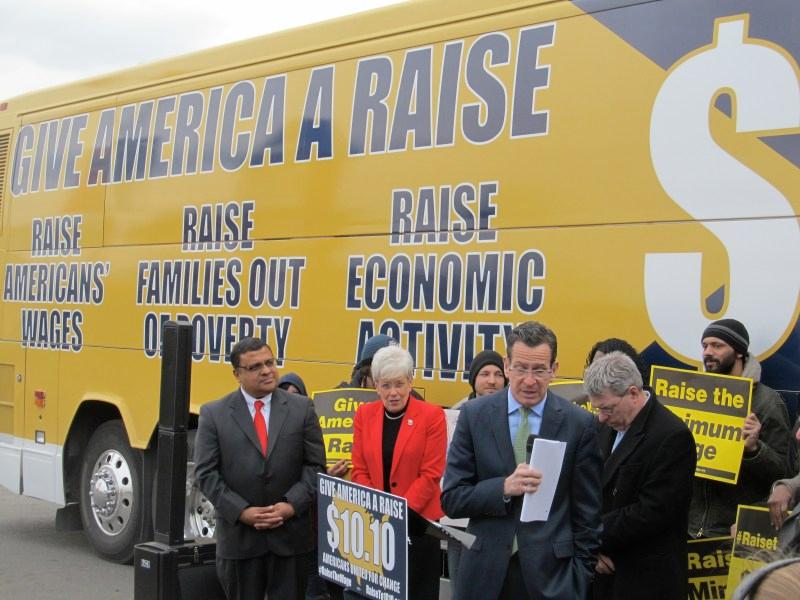From Paddi's Desk
by Paddi LeShane

Around the halls of the Legislative Office Building, all eyes were focused on the appointment of Governor Ned Lamont's pick to head the Department of Economic and Community Development, David Lehman. Lehman currently acts as the administration's senior economic advisor, and this nomination would expand his role as DECD Commissioner. Depending on who you talked to it was either going to be a close vote, sewn up or a hopeful yes.
As it turned out, only eight votes were cast in opposition to the nomination, with many approved votes being based on not so much the candidate, but a sense of protocol that a new Governor should have an opportunity to have his own people running the departments and agencies that reflect the Governor's agenda.
Some questioned Lehman's previous involvement at Goldman Sachs with the decades-ago housing crisis. Other were disappointed in the announced economic priorities of the Governor and felt they wanted to let the Governor know their position by opposing the nomination.
So now that the votes are over, what's next? Many hope it's the start to rebuilding workplaces and finding the right tone to keep and attract solid new manufacturing businesses and innovative high tech initiatives, as well as creating a positive narrative for doing business in CT.
Everyone wants the Governor to succeed and the hope is that by supporting Mr. Lehman, it is a step in the right direction.
So guys, giddy up. Let's go!
|
|
 |
|
by Mike Johnson
With all eyes on the top priorities of the session looming, on Wednesday the legislature went into session for the final time before they start taking action on individual bills.
The legislature acted on nominations that didn't grab any headlines, except for a vote on the nomination for the Commissioner of the Department of Economic and Community Development (DECD) and a resolution to approve a negotiated union contract providing an 11% raise for assistant attorney generals.
The soon to be DECD Commissioner David Lehman spent over a month since his nomination hearing meeting with senators (his nomination only needed Senate approval) to convey his willingness to work together on initiatives important to driving the state's economy. His previous role working at Goldman Sachs which infamously heavily invested in shorting mortgage-backed securities during the 2008 economic collapse drew some attention from left leaning legislators. After all the debate, Lehman passed by a vote of 28-8.
This week House and Senate also considered a resolution approving a new bargaining contract for assistant attorney generals in the state who had not received a raise in their rate for quite some time. By law, these contracts can either be approved by the legislature or they are moved to a binding arbitration panel for final approval. The legislature ultimately decided to approve the vote along mostly party lines with most Democrats voting yes and all Republicans voting no.
With bills set to be acted on or referred by the next legislative session day, the stakes rise even higher!
|
|
|
|
2019 Behind the Scenes
by Chelsea Neelon
This week, we featured State Representative Liz Linehan of the 103rd House District and Chairwoman of the Children's Committee.

What are your legislative priorities this session?
-
My main priority is HB7215, a school climate, bullying, and child suicide prevention bill. This December, an 11 year old named Anjelita died by suicide in my hometown of Cheshire, bringing to light some concerns about school climate, bullying, and social emotional learning. Anjelita's Law will bring social emotional learning to districts with an emphasis on prevention and intervention for children in crisis. I'm thrilled by the support, collaboration, and feedback of districts across the state, showing there is a real desire for this information, and a need for clarification in our current laws as we navigate the changing challenges facing our children and our schools.
What are your legislative priorities this session?
-
HB5210 - 10 Essential Health Benefits. Current federal law dictates health insurance plans must cover ten benefits that include many basic services that families rely on.
HB5210
ensures that even if the federal health care law changes in the future, Connecticut residents will maintain these benefits in their health care plans. We know that a top reason for bankruptcy is often medical debt, and this law helps protect the residents of Connecticut by requiring insurance coverage of these benefits regardless of any federal attempts to dismantle to ACA.
- I am also proud of passing laws to protect people with Autism, and I am continuing that work this session with two new pieces of legislation.
Last question! What's your favorite hobby?
-
I'm a state record holding power lifter in the deadlift, bench, and squat. I'm coming off an Achilles injury after 18 months, but I've just started training again, and hope to compete at least one last time in the fall.
|
|
|
Did You Know?
This Week in CT History
March 26, 2014
The First State in the US to Raise the Minimum Wage Above $10

On March 26, 2014, Connecticut became the first state in the country to pass legislation that set its minimum wage above $10 an hour. The new law mandated slight increases rolled out over three years, slowly building up the state's minimum wage to $10.10 an hour by the start of 2017, and would affect over 70,000 Connecticut workers who earned an hourly wage.
Governor Dannel Malloy, who was in the midst of a re-election campaign following his first term in office, lobbied hard for the increase after President Barack Obama gave a series of speeches focusing on the topic in early 2014, including one given at Central Connecticut State University on March 5 where the President directly invited the governors of Connecticut, Massachusetts, Rhode Island, and Vermont - all of whom were in attendance - to increase their states' respective minimum wages.
Proponents lauded the move as beneficial for the Connecticut's working poor, while those opposed warned that government-mandated wage increases would discourage business growth and exacerbate the state's unemployment rate. On March 26, the legislation passed through both chambers of the state legislature, making Connecticut the first state to codify a minimum wage of over $10.
|
|
|
|
 |
|
CT Agency Corner
By Chelsea Neelon
Tolls, tolls, tolls. Talk about the possible implementation of tolls has taken up a lot of the discussions during this legislative session, especially after three tolls related pieces of legislation made their way out of the Transportation Committee last week.
Whether you're a supporter or an opponent of the possibility of tolls, a decision regarding the issue is imminent this session. Democratic leaders are still trying to rally the votes within their caucuses, but Republican leader of the Senate Senator Len Fasano made it clear that his caucus members are not likely to budge on their stance regarding the implementation of tolls. "My caucus has a philosophical problem with allowing another taxing beast into our system,'' Fasano told reporters. "You've got this beast, which is called the toll monster that can continue to raise tolls."
One of the bills that passed out of Transportation last week would direct the Department of Transportation to create a plan to place tolls along I-95, I-84, I-91 and Route 15, and would still need the approval from federal regulators. The Republican plan, "... would give transportation repairs priority for state bonding money over other needs, such as schools, athletic fields, community centers and other capital construction projects."
There's less than 50 business days left in the legislative session and the clock is ticking!
|
|
|
Municipal
Roundup
by Ryan Bingham
Municipal elections are coming up in November, and candidates are gearing up for their runs, especially in CT's big cities.
This November, New Haven Mayor Toni Harp will run for re-election against Justin Elicker. Elicker ran against Harp before she was an incumbent mayor and lost the race by nearly 1,800 votes. This time around, New Haven residents are questioning the candidate's plan, as he faces a candidate who is now a strong incumbent with even more funding and a strong GOTV (Get out the Vote) apparatus.
When asked how his campaign plans to beat Harp this time, as reported by the New Haven Independent, Elicker replied, "I have spent five years learning how to be a leader at the New Haven Land Trust, and I see so many examples around the city of ways that City Hall could be serving the people of New Haven better." In recent weeks, he has called out the Harp administration over its handling of lead abatement in the city, and its failure to be a strong advocate for explicit subpoena power for the city's new Civilian Review Board. Elicker recently stated that he has, "been working his tail off," and will reach fundraising goals for the first quarter very shortly.
In Hartford, incumbent Mayor Luke Bronin is seeking re-election, among a sea of other candidates looking to secure his seat. State Representative Brandon McGee (D-Hartford), Hartford Board of Education Chair Craig Stallings, and local business man J. Stan McCauley will all challenge Bronin at the September 10th primary. Former Mayor Eddie Perez has recently hinted at a potential run, however no final decision has been made according to his consultant. Perez was convicted in 2010 of five felony corruption charges connected to home repairs by city contractors, and faced an extortion case involving a North End power broker. Perez' conviction was overturned in appellate court in 2013, a decision that was upheld by the Connecticut Supreme Court. While the previous controversy looms over Perez's head, some community members are optimistic about his run, highlighting his effectiveness as mayor.
We will be sure to keep you updated on all the latest action.
|
|
 |
 |
 |
 |
|
 |
|